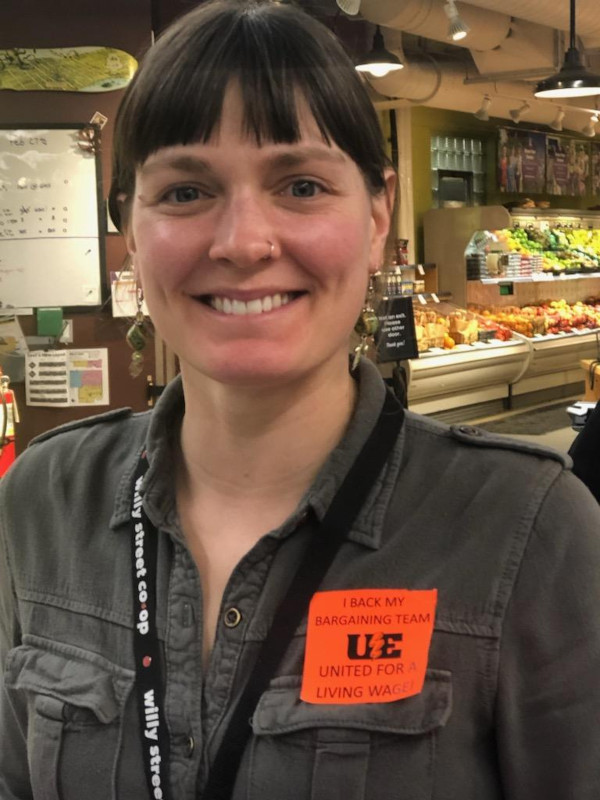Members of UE Local 1186 overwhelmingly ratified a new three-year agreement with Willy Street Co-op on Monday, March 15, which secured structural changes in the contract that ensure pay equity and will allow the union to build on gains for years to come.
The local prioritized getting to a $20/hour starting wage, equity raises based on seniority, and protecting members from rising inflation and skyrocketing housing costs in Madison.
Mobilizing early, activating their Contract Support Committee (CSC), and organizing around department-level fights leading up to bargaining created the conditions that allowed Local 1186 to deliver some major wins for its members. The new contract brings up the starting wage, creates seniority steps, and guarantees that raises will keep up with inflation. If inflation spikes again and surpasses the negotiated wages in any year of the contract, the member will receive a raise equal to inflation as calculated by the US Department of Labor Consumer Price Index, or the contact rate, whichever is higher.
Co-op Workers Give Management a Lesson In Economics

Local 1186 members Kate Barry (above) and Russell Layne (below) demonstrate their support for the bargaining team at work.

Vice President Allie McDonald said, “Non-economics went pretty smoothly, but when we got to economics, instead of bringing a proposal the co-op presented us with financial ‘data’, and what I can only describe as a lecture in the economics of running a co-op. They complained about the rising cost of commercial rent and argued our wage proposals would force them to close two of the four locations.
“Our response was, ‘Okay. If you can’t afford to pay a living wage then why keep the co-op open? There are a dozen places to buy organic food in Madison.’ What makes us different is how we treat the workers who stock those products. We then collected stories from across the co-op and the next day presented management with a lesson in the economics of living on a co-op wage. After that, they regrouped and came back with what I would describe as a serious wage proposal.”
“This contract was kind of a trifecta,” said Chief Steward Kevin Sites. “It brings up the bottom, rewards seniority while protecting members from inflation, and phases out the historic inequity which was a relic of the old ‘merit pay’ system that predated the union.“ The new three-year agreement includes $3.65 across-the-board increases that will bring the starting pay to $20.55 per hour by the end of the contract.
Union Wages Eliminate Disparities In A Concrete and Material Way
Since the last contract, the co-op has had a very public focus on Diversity, Equity, and Inclusion (DEI) and approached the local executive board about forming a joint DEI committee with management. At the time, President Mike Tomaloff said, “We told ’em you're talking to the DEI committee, you do the hiring here and there are not enough people of color employed at the co-op to have a serious conversation about diversity and inclusion until you hire more people of color.”
Tomaloff continued, “We suggested they provide managers doing the hiring with implicit bias training and followed up with an information request for gender and racial demographic information of the bargaining unit. We used that information in bargaining to present the co-op with data that demonstrated how the old merit pay system had created a wage gap that disproportionately impacted people of color and that the representation of Black workers at the co-op had decreased since they implemented their DEI initiative. Then we presented a concrete proposal for a new seniority-based equity pay structure that phases out that wage gap.”
Asian workers hired before the co-op organized make 8.3 percent below the average, while Asian workers hired under the union scale now make one-quarter of a percentage point less than the average. Latino workers hired before the union make 7.14 percent less than the average, while their counterparts hired since the union make 3.74 percent less. While there are no Black workers at the co-op who have been employed for more than four years, Black workers hired since the union organized make 3.69 percent more than the co-op average.
Equity Through Action Not Acronyms
Bargaining team member Matthew Thompson said, “Outside of the co-op I’m an active member of DSA, The Poor People’s Campaign, and a regular contributor to WORT FM’s Labor Radio. Supporting those community allies gave us power in bargaining. What was also implicit in our discussion about equity and implicit bias was that we could solve these issues at the table or we could have a very public discussion about whether the Co-op is living up to its own stated values.
“We both concluded that it would be better to work together to phase out the racial pay gap with a more objective and fair pay system. That’s what we call equity through action, not acronyms. I came out of this contract feeling that this contract is now a gold standard for our industry. Since we settled the contract we’ve already had grocery workers at other Madison groceries reach out about how they organize their workplace.”
To address the lack of diversity in hiring, the co-op also accepted the union's proposal to create paper job applications to reduce barriers to entry for anyone without a computer and to have those translated into Spanish and Hmong, both populations in Madison that are under-represented at the co-op.
More Time For What We Will
The local bargaining committee made a strategic decision to concentrate proposals on wages but didn’t ignore other priorities expressed by the members in meetings leading up to bargaining. In addition to wages, the bargaining team negotiated an additional 40 hours of unpaid discretionary time off that can be used at the members’ discretion with 48 hours' notice, and additional medical leave. North Site Steward Kim Ritz said, “A number of our members have recently had unplanned accidents or illnesses. Under the old contract, we received the minimum under FMLA. In this contract, we modeled our proposal on Local 1107’s language that extends FMLA to anyone who completes probation and increases time based on years of service.
“What we won was one additional medical leave of up to 90 days that can be used by anyone who has completed their probation period and does not qualify for FMLA, or who has already exhausted FMLA. It’s not everything we wanted but this meant a lot to a lot of our members. This time is unpaid, but we also made important improvements in our shared sick bank that provides paid time.”
Lessons Learned: Organizing Early Pays Off
Local 1186 President Mike Tomaloff shared some reflections on bargaining:
Starting early and holding weekly Contract Support Committee meetings leading up to and throughout bargaining engaged the membership and ultimately gave us the power to win gains a lot of people didn’t think were possible.
Constant communication with our members gave us the ability to mobilize and escalate when we needed to. When we asked the members to take action they knew exactly what we were fighting for and they stepped up. Small actions like visibility days when management walked in and saw the whole store wearing shirts that read ‘The Co-op Works Because We Do’ sent a message that we’re done with poverty wages.
Every worker who wore a sticker reading “Ask Me if I Make a Living Wage” contributed to this victory. We’re the public face of the co-op and the co-op is very aware of their public image.
The Local 1186 bargaining committee consisted of President Mike Tomaloff, Vice President Allie McDonald, Chief Steward Kevin Sites, Financial Secretary Beth White, Recording Secretary Kjerstin Bell, East Site Steward Michele McCoy, West Site Steward Matthew Thompson, and North Site Steward Kim Ritz. They were assisted by Field Organizer Sean Fulkerson.
